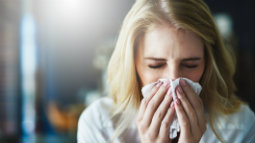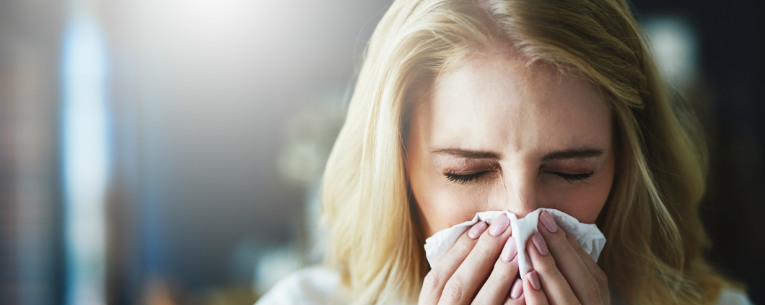You hear an ominous sound from the row behind you.
Cough. Cough.
You shift in your seat and hold a napkin to your nose, hoping the thin paper will filter out your fellow plane passenger's germs.
Cough. Hack.
You silently resign yourself to getting sick on vacation. On the flight home, maybe you’ll be the one coughing on your fellow passengers. Yuck.
Here’s the good news: You can protect yourself from getting sick on a plane. We’ll tell you how.
Are there really a lot of germs on airplanes?
You’re not being paranoid — the chances of getting sick on a plane are pretty high. While estimates of risk vary, one study found the cold transmission rate on aircraft was 113 times the normal rate on the ground.i The reasons include the close proximity of passengers, the low rate of outside air ventilation and the dryness of the air.
And airplanes are dirty. One microbiologist's investigation of eight flights found the MRSA superbug and norovirus on four out of six tray tables. He also discovered E. coli bacteria on 30 percent of plane bathroom sinks, toilet handles and faucet handles.ii
There are no industry-wide regulations on how well or how often planes must be cleaned. While airlines tidy up between flights, there's not enough time to wipe down surfaces or clean out the seat-back pockets. If you’re a serious germophobe, you can choose a cleaner flight. “Most carriers schedule a more thorough scrub, when crews wipe down seats and tray tables with disinfectants, for when a plane overnights at an airport,” Travel+Leisure reports. So if you take the first flight in the morning, it’ll be cleaner than the last departure of the day.iii
Your ticket price can affect how clean your seat is, too; according to the Wall Street Journal, Delta and United wipe down tray tables and windows between flights only in the first-class section.iv
What to pack to help you avoid airplane germs
Feeling icky? Don’t despair! You can be proactive by packing these things in your carry-on:
- Hand sanitizer: If you dislike the smell and sticky feeling of Purell, try other brands, such as Bath & Body Works' fragranced options or alcohol-free sanitizers.
- Disinfecting wipes: These are essential for killing germs on airplane surfaces.
- Single-use alcohol wipes: While tech experts caution that these can damage electronics, we’ve used them for years to clean dirty phone screens and other items without a problem.
- Tray table covers: The trayGUARD is an antimicrobial cover for your airplane tray table. A version for kids can be decorated with crayons.
- Travel packs of tissues: Offering a pack to your sneezing seatmate may save your sanity.
- Seat covers: Prefer not to sit on soiled seats? PlaneSheets are washable seat covers in toile, leopard print and even camo.
- Pillow and blanket: Airline pillows and blankets are washed as infrequently as once per month, so bringing your own is a smart idea.v
- Saline nasal spray: Adding moisture to your nose can help boost your body’s germ defenses.
- Surgical masks: If you have a compromised immune system, or if you just really, really want to avoid airplane germs, a face mask can help reduce your risk of getting sick.vi
- Vitamins: Taking supplements like vitamins C and D, zinc and echinacea hasn’t been proven to prevent getting colds while flying, but some travelers swear by them.vii
Fighting germs on airplanes: What to do on board
Once you’re on the plane, use your wipes to disinfect hard surfaces: your tray table (top and bottom), your armrests, your TV-screen remote, your seat buckle and the call buttons. The tray table is the most important — it tops the list for bacteria per square inch.viii
Turn on the overhead air vent. While you may shudder at the thought of germy air blowing down, the cabin filters actually clean the air as it comes through.ix
Drink lots of water. Eight ounces per hour is a good guideline.x Staying hydrated not only serves as a defense against dry cabin air, but can ease jet lag and keep you healthier overall.
When you use the airplane bathroom, wash your hands thoroughly and use a paper towel to open the door. (Door latches are another germ harbor). Don’t drink water from the sink or use it to brush your teeth.
Remember that no matter how careful you are, it's still possible that you'll get sick while traveling. That's why travel insurance is so important. If you need to cancel or interrupt your trip because of a covered illness, travel insurance can help you avoid losing all the money you spent. Travel insurance with emergency medical benefits can also reimburse you for the cost of emergency medical treatment received while traveling abroad. Allianz Global Assistance provides travel insurance plans for every destination and budget. Get a free quote for your next trip.








Share this Page